
Are you tired of watching your teenager suffer in silence, dealing with OCD and debilitating anxiety that leaves them feeling lost and helpless?
OCD and severe anxiety can take over the lives of young people, draining their happiness and independence. They are constantly caught in a trap of obsessions and compulsions that control their every move. It's a nightmare for both the teenager and their loved ones.
There's hope with Exposure and Response Prevention (ERP) therapy. ERP therapy is a powerful tool that helps combat these afflictions and allows teenagers to regain control of their lives. ERP treatment offers life-altering tools to confront and suppress obsessive thoughts and compulsive behaviors, so your teenager can overcome their condition and confidently move towards a future filled with endless possibilities.
At WayPoint Academy, we specialize in providing ERP therapy to treat obsessive-compulsive disorder, severe anxiety other mental disorders. We've seen incredible results in helping teens overcome their struggles. Below, we will explore how ERP therapy works and why it is the most effective solution for teens with severe anxiety and OCD.
(click below to go to a section on this page)
Understanding Anxiety & OCD in Teens: Symptoms, Causes, and Impact
Anxiety and OCD are among the most common mental health conditions that affect teenagers. Parents need to understand the symptoms, causes, and impact of these conditions in order to provide the best possible support for their struggling teens.
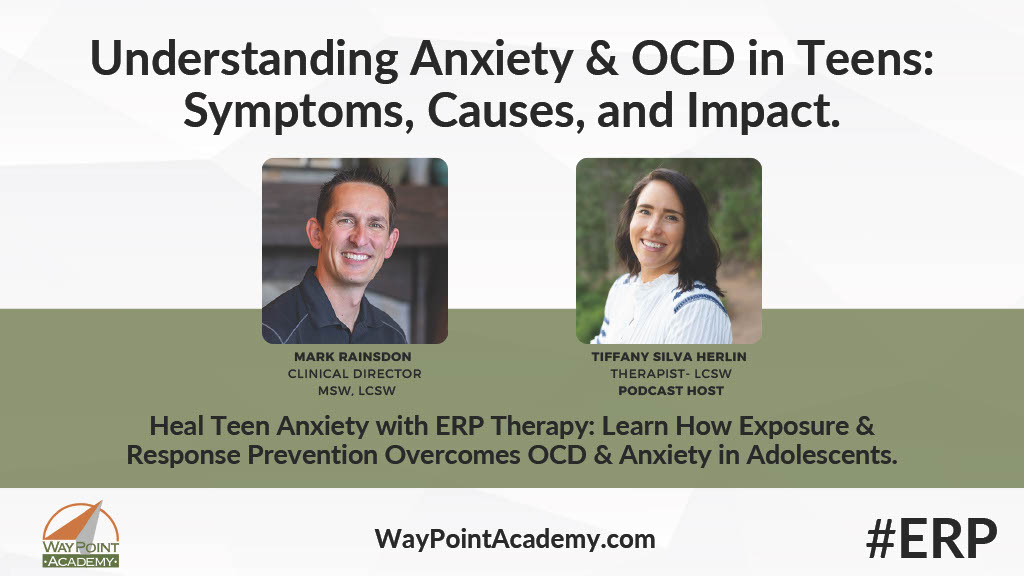
Symptoms of Anxiety & OCD
Symptoms of anxiety in teens can vary but often include excessive worry, restlessness, irritability, difficulty concentrating, and physical symptoms such as headaches or stomachaches. OCD is characterized by:
- Triggers - Triggers for OCD can be thoughts, images, situations, or feelings that prompt obsessive thoughts and compulsive behaviors. As OCD affects people in different ways, triggers can vary significantly among individuals.
- Obsessive or Intrusive thoughts - These thoughts are intrusive, unwanted, and distressing, causing significant anxiety or discomfort for individuals who experience them. Teens with OCD often struggle to control or eliminate these thoughts, leading to the development of compulsive behaviors or rituals as a way to cope with the anxiety.
- Compulsive behaviors - also known as rituals, compulsive behaviors are repetitive actions or mental acts that teens with OCD feel driven to perform in response to their obsessive thoughts. These behaviors are intended to alleviate the anxiety or distress caused by the obsessions or to prevent a feared event from occurring.


How Common is OCD in Teens?
Obsessive-compulsive disorder (OCD) impacts 1% to 3% of the youth population, with teens usually aware that their compulsions and obsessions are not based on reason. The comfort they gain from engaging in these repetitive actions reinforces their condition.
A diagnosis of OCD for a teenager is determined by several criteria.
- The inability to control obsessive thoughts or compulsive rituals.
- Spending at least one hour per day on these intrusive thoughts and routines.
- Experiencing significant disruption in daily life due to these behaviors.
To combat OCD, treatment commonly employs methods geared toward addressing this disorder, such as cognitive behavioral therapy - prominently Exposure and Response Prevention (ERP). This strategy assists individuals in confronting anxieties thereby lessening reliance on ritualistic behavior patterns. Some patients might find medications advantageous for managing symptoms linked to OCD.
What Causes OCD in Teens?
Family participation is essential in the healing process. Through family therapy, parent visits, and seminars, WayPoint Academy directs families toward making adjustments and changes to support their student's progress.
- One possibility is that changes in brain function or natural chemistry may contribute to OCD.
- Genetics may also play a role, though specific genes have yet to be identified. In families with a history of OCD, there's a 25% chance that another immediate family member will develop symptoms. Childhood OCD has a stronger genetic link than adult-onset OCD, with up to 65% having a genetic link.
- Another potential theory is that OCD is a learned coping response, where obsessive fears and compulsive behaviors are acquired through experiences over time.
- Certain risk factors can also increase the likelihood of developing OCD, such as having a family history of the disorder, experiencing traumatic or stressful events, or having other mental health disorders such as depression, autism spectrum disorders (ASD), ADHD, or tic disorders.
You are not your illness. You have an individual story to tell. You have a name, a history, a personality. Staying yourself is part of the battle.
My OCD is a speed bump, not a barrier, to happiness.
The Impact of OCD & Severe Anxiety on Teens
The impact of anxiety and OCD on teens can be far-reaching. These conditions can interfere with academic performance, social relationships, and overall quality of life. Teens who struggle with OCD or an anxiety disorder may begin to avoid specific situations or activities that trigger their symptoms. They may require others to accommodate their lives to prevent facing these triggers and may struggle to complete tasks due to their anxiety or obsessive thinking. These behaviors can lead to feelings of isolation and limit opportunities for personal growth and development.
Exposure Response Prevention Therapy: What It Is & How It Works
Exposure Response Prevention Therapy, or ERP therapy, is a highly effective treatment developed specifically for treating OCD and severe anxiety. But what exactly is ERP therapy and how does it work?
ERP therapy is a type of cognitive-behavioral therapy (CBT) that focuses on exposing individuals to anxiety-provoking situations or thoughts (triggers) while preventing them from engaging in compulsive behavior and rituals.
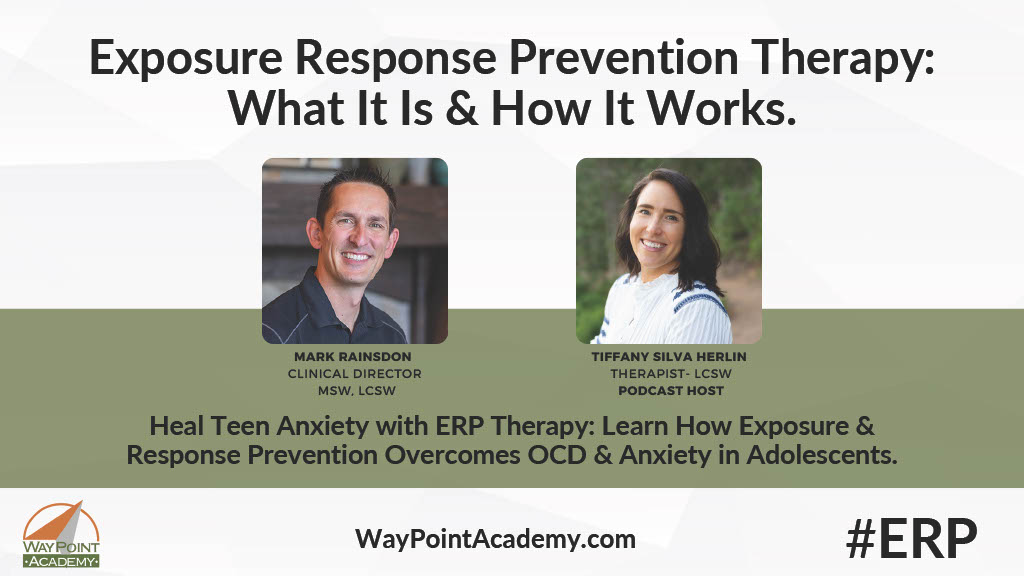
ERP Therapy Is the Gold Standard for Treating OCD in Teens
Exposure and response prevention (ERP) therapy stands as the leading treatment for children and adolescents struggling with OCD. Renowned for its impressive 60% - 80% success rate, this approach is widely regarded as the most effective method for treating obsessive-compulsive disorder and helping teens regain control over their lives.
By gradually introducing teens to their anxieties while minimizing compulsive behavior, exposure therapy empowers them to recognize that their OCD thoughts have no power. As a result, teens develop healthier coping skills allowing them to reclaim a sense of control over their lives. Here at WayPoint Academy, our team of expert therapists specializes in providing residential OCD treatment. We are proud to offer a comprehensive ERP program that is tailor-made for teens with OCD. Throughout the ERP process, our dedicated therapists provide unwavering support and proven OCD therapy, guiding our patients every step of the way.
The Goal of ERP Therapy
The primary goal of ERP therapy is to empower struggling teens with improved distress tolerance, effective coping mechanisms, and healthier responses to their anxiety and OCD cycle. Through ERP therapy, your teenager will be able to confront their anxiety and OCD triggers, while simultaneously reducing the influence of their obsessive or intrusive thoughts. They will also learn to resist the urge to engage in compulsive behaviors and rituals that they previously relied on to relieve their anxiety.
As adolescents acquire more adaptive coping strategies, ERP therapy offers them opportunities to practice response-prevention techniques by gradually exposing themselves to their anxiety triggers. Eventually, these triggers will lose their grip on their lives.
At its crux, OCD treatment is about learning to live with the discomfort of uncertainty.
Types of Exposure Exercises
When undergoing exposure and response prevention therapy, there are several ways that exposure can be tailored to meet your teen's specific needs and preferences. These include:
- In vivo exposure - this approach involves directly confronting the feared object, situation, or activity in real-life settings. For instance, an individual struggling with a fear of snakes may be encouraged to physically handle one, while a teenager experiencing social anxiety might be advised to hold a signboard in a busy location or deliver a speech in front of a live audience.
- Imaginal exposure - this is a method that involves intensely picturing the dreaded object, situation, or activity. For instance, an individual suffering from contamination OCD can envision being sneezed upon and mentally strategize how they would control their compulsive reaction. This technique can be especially advantageous for adolescents who have experienced trauma and are grappling with Post-traumatic Stress Disorder (PTSD).
- Virtual reality exposure - this can be an effective alternative when in vivo exposure is not feasible. By employing advanced technology, individuals can simulate their feared experiences, such as a simulated flight for those with a fear of flying. A therapist creates a safe and controlled environment where teenagers can experience the sights, sounds, and even smells of the situation in a way that is most beneficial for them.
- Interoceptive exposure - this entails creating harmless physical sensations that anxious teenagers associate with their fears or a fear response. For example, someone afflicted with Panic Disorder may be advised to engage in a physical activity like running in place to elevate their heart rate. This exercise enables them to understand that this particular sensation is not harmful. Thus, when they experience a heightened heart rate in the future, it will not trigger or worsen a panic attack.

ERP Techniques for Teen OCD & Severe Anxiety
ERP therapy utilizes a range of techniques to provide long-term relief for severe teen anxiety. These techniques are designed to empower teens to confront their fears and develop healthier coping mechanisms.
- Identify triggers, anxious thoughts & obsessions, rituals, and compulsive behavior - The initial stage of ERP therapy for your teenager involves discussing their fears, triggers, maladaptive thoughts, rituals, and compulsive behaviors with their therapist. This process will focus on four key areas:
- Exploring obsessions, intrusive thoughts, and urges
- Understanding both the mental and physical rituals they engage in, including actions taken to alleviate anxiety or prevent undesirable outcomes
- Identifying the specific fears associated with not completing their rituals
- Recognizing the things they actively avoid to prevent feelings of nervousness, intrusive thoughts, or compulsions.
- Psychoeducation - Psychoeducation in ERP therapy involves helping teens understand the symptoms of OCD, traditional psychological treatment, and the research that will help interrupt their anxiety and OCD cycle. Through this understanding, teens can develop healthier coping mechanisms and gain control over their thoughts and behaviors.
- Creating an exposure hierarchy - Also known as a “fear hierarchy” or “fear ladder,” an exposure hierarchy involves creating a list of anxiety-provoking situations ranked from least to most distressing. This helps teens gradually work their way up to confronting their fears in a controlled and gradual manner, under the guidance of their therapist.
- Tolerating uncertainty - One key aspect of exposure therapy involves teaching teens to tolerate uncertainty. When teens with severe anxiety and OCD experience distressing thoughts, their usual response is to engage in compulsions. Through ERP, however, teens confront these distressing thoughts and gradually learn to tolerate the uncertainty that comes with them. This helps them build resilience and reduce their anxiety response over time.
- Practicing graded exposure - Engaging in graded exposure involves teenagers intentionally facing anxiety triggers in a controlled and gradual manner. They begin by confronting their smallest fears and gradually move towards more distressing exposure exercises. Graded exposure can be conducted in real-life situations (in vivo), through the use of imagination (imaginal exposure), or a combination of both approaches.
- Imaginal exposure scripts - Exposure scripts offer an alternative to small exposure steps for anxious teens. This technique uses imagination to create controlled exposure opportunities, allowing teens to gradually confront their fears. The script involves identifying and recording the thought patterns, threat expectancies, and avoidance behaviors that contribute to their anxiety or OCD. Exposure scripts should be vivid and should incorporate specific details (e.g., sights, sounds, smells, textures, thoughts, feelings). Confronting these patterns can help teens tolerate uncertainty and develop better coping mechanisms and prepare to engage in more rigorous forms of exposure.
- Response prevention - the most essential element of ERP therapy is response prevention, where teens practice skills that help them actively resist engaging in compulsive repetitive behavior or avoidance tactics. This helps them understand that their anxiety and OCD thoughts are not as powerful or threatening as they may believe.
- Exposure Homework - Once patients have become skilled in using response prevention techniques during their therapy sessions, they begin to apply these techniques in their daily lives. Exposure homework involves intentionally exposing oneself to situations that may trigger their urges and then resisting the temptation to engage in their usual rituals.
- Delaying rituals - To further resist compulsive behaviors, therapists may suggest delaying rituals. By increasing the time between the onset of the obsession and the need to perform a compulsion, teens can learn to resist the compulsion altogether. This delay can help build tolerance for uncertainty and promote healthier coping mechanisms.
- Modifying rituals - Therapists may suggest modifying rituals, encouraging teens to perform them differently or delay them altogether. This can help them understand that their obsessions do not become real when they don't perform their usual compulsions, and develop healthier coping mechanisms over time.
- Relapse Prevention Planning - As ERP therapy nears its conclusion, your teenager will be guided to develop a relapse prevention plan. This step is crucial for ensuring their ongoing success in managing OCD symptoms. By identifying effective strategies to avoid relapses and formulating a contingency plan, your teen will be equipped to handle any potential setbacks that may arise.
You don’t have to control your thoughts. You just have to stop letting them control you.
Long-term Benefits of ERP for Teen Anxiety Disorders
ERP therapy is a highly beneficial treatment for reducing symptoms of severe anxiety and OCD in teenagers. By confronting fears and triggers head-on while avoiding rituals that temporarily relieve anxiety, this specialized form of therapy helps teens realize that their anxieties and OCD thoughts are not as powerful or dangerous as they may initially seem. One of the primary features of ERP therapy is the gradual repeated exposure to anxiety triggers, which allows teens to gain a sense of control over their anxiety and learn healthier coping mechanisms. As a result, they acquire valuable skills that can help them manage their symptoms in everyday life, even after the completion of treatment.

ERP Empowers Your Teen to Stop Avoiding
Teens use avoidance to escape the anxiety and discomfort of a feared situation, "prevent" something bad from happening, or reduce the likelihood of being triggered. Facing fears head-on without avoiding them can expand your teen's world, enabling them to do activities that they once avoided because of anxiety or OCD. They can regain their autonomy and independence by experiencing life again. With successful response prevention practice, the time spent on compulsions is freed up, leaving more time for more meaningful things.
ERP Decreases Your Teen's Need for Accommodations
Through ERP therapy, teens can learn to approach anxiety and other uncomfortable emotions in a different way, accepting their presence without resistance or avoidance. This process naturally builds their capacity to tolerate discomfort, which can lead to decreased reliance on accommodations from others. This increased independence can help teens experience greater freedom and autonomy in their daily lives.
ERP Enhances Your Teen’s Confidence
As teens confront their fears and develop healthier coping mechanisms, they gain a sense of mastery over their anxiety and OCD. This newfound confidence extends beyond treatment into different areas of their lives, equipping them with greater resilience and the ability to handle challenges more effectively.
ERP Therapy Rewires the Brain
Exposure to anxiety triggers in ERP therapy leads to habituation, reducing the intensity of anxious responses. As teens face their fears, their brain learns to interpret them as safe, rewiring the neural pathways and leading to long-lasting reductions in anxiety and improvements in overall well-being.
ERP Helps Your Teen Have a More Accurate View of the World
ERP therapy assists teens in developing a more accurate view of the world by challenging unhelpful thoughts and reframing fears. This process can help them break free from distorted perspectives caused by anxiety and OCD and cultivate a more balanced outlook.
It’s not the thoughts but rather what you do with them that maintains the OCD cycle.
Proven Effectiveness of ERP Treatment in Overcoming Teen OCD & Anxiety
Exposure and Response Prevention Therapy (ERP) has been proven to be highly effective in helping teens overcome severe anxiety and OCD. ERP treatment has been supported by numerous studies and research, demonstrating its positive treatment outcomes. It is considered the gold standard for treating OCD and severe anxiety, with 60% - 80% of participants achieving symptom recovery. The combination of ERP therapy and medication is more effective than treating OCD with medication alone. Furthermore, treatment gains have been proven to be maintained long-term.

Research has also shown that ERP therapy produces long-lasting results. Teens who undergo ERP treatment experience significant reductions in their anxiety and OCD symptoms, leading to improved overall functioning and quality of life. ERP therapy not only addresses the immediate symptoms but also provides teens with the tools they need to maintain sustainable relief in the long term.
ERP therapy is also effective at treating other related disorders including general anxiety disorder, social anxiety disorder, and panic disorder.
It's important to note that ERP therapy is a gradual and systematic process. Your teen will start with exposures that are less distressing and gradually progress to more challenging situations. This helps them build confidence and develop the necessary coping mechanisms to manage their anxiety or OCD. But this means that the treatment effectiveness of ERP therapy depends on completing the program.
Recovery from OCD is possible. Keep fighting, keep pushing, and most importantly, keep believing in yourself.
How Does Exposure and Response Prevention Therapy Differ From Traditional Talk Therapy for Anxiety & OCD in Teens?
When it comes to teenagers struggling with obsessive and intrusive thoughts, talk therapy alone may not always be the best solution. In fact, it can sometimes worsen the situation by giving these thoughts more attention and importance. Merely discussing fears and concerns in a typical therapy session, without incorporating exposure therapy work, might offer temporary relief for teens, but lack the essential tools for effectively managing their condition long-term.
When teenagers struggle with OCD and intense anxiety, typical cognitive therapy sessions often involve trying to understand where their intrusive thoughts come from so they can make sense of them. However, this approach can make the thoughts seem more important and worsen the symptoms. To effectively manage their conditions, teenagers need to realize that their intrusive thoughts are just thoughts and don't have any real power or value. Sometimes, they shouldn't believe everything they think. As a result, downplaying the significance of such thoughts is a critical component of ERP sessions.
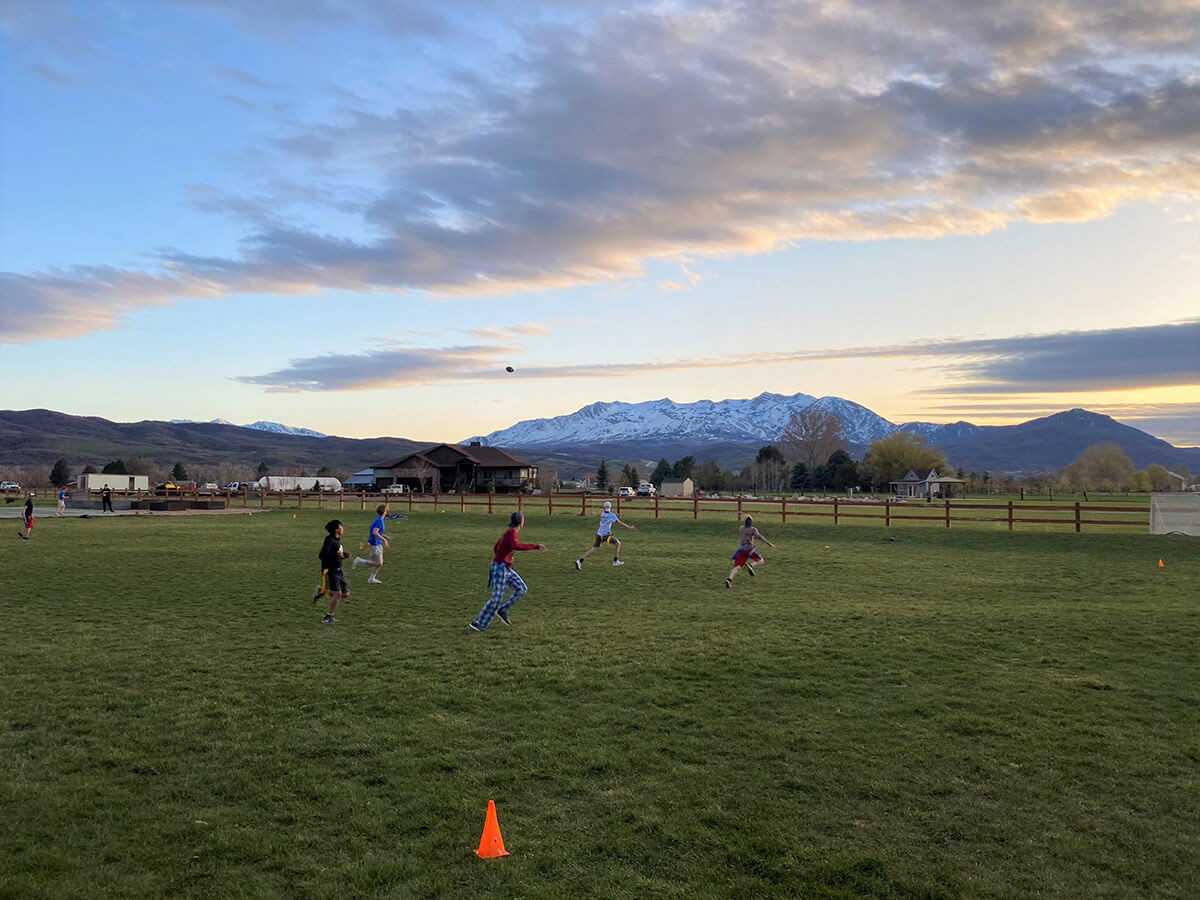
Take, for example, a teen with OCD who is plagued by a fear of contamination. In a talk therapy session, a therapist may discuss your teen’s irrational fear at length, but without exposure and response prevention (ERP) therapy, they may continue to rely on their compulsive rituals to ease their anxiety.
ERP therapy is specifically designed to help an OCD patient gradually confront their anxiety triggers while resisting their usual obsessive-compulsive responses. Rather than investigating the root causes of their thinking errors, this approach allows teenagers to learn that their obsessive and intrusive thoughts and fears are not as potent or dangerous as they may have initially thought. In this way, ERP therapy helps shift the focus away from the significance of intrusive thoughts and toward your teen's ability to manage them.
Studies consistently show that ERP therapy is the most effective form of treatment for OCD and severe anxiety. According to the International OCD Foundation, "Talk therapy can be helpful in many ways, but for OCD specifically, specialized [ERP] treatment is needed to get better."
With exposure and response prevention (ERP) therapy, your teen can gain more control over their life and overcome their OCD or severe anxiety. It's time to explore a treatment approach that has proven to be effective and transformative for teens like yours.
I used to think that the brain was the most wonderful (smartest and best) organ in my body. Then I realized who was telling me this.
Are There Any Treatments Or Therapies That May Be Recommended Alongside ERP For Anxious Teens?
While ERP therapy is highly effective in reducing symptoms of severe anxiety and OCD in teens, there are additional treatments that can be recommended to complement the benefits of ERP therapy.
- Cognitive-Behavioral Therapy (CBT): CBT works in tandem with ERP by addressing distorted thought patterns and helping teens challenge and reframe their anxious or obsessive beliefs. By combining cognitive restructuring with exposure techniques, we empower teens to manage and modify their responses to anxiety triggers effectively. Traditional CBT is especially beneficial for obsessional patients who lack overt rituals.
- Acceptance and Commitment Therapy (ACT): ACT complements ERP by fostering mindfulness and acceptance. This modality helps teens develop psychological flexibility, allowing them to embrace challenging emotions without judgment and commit to value-driven actions, which is crucial in the face of anxiety or obsessive-compulsive tendencies.
- Motivational Interviewing: This collaborative approach has been shown to enhance the effectiveness of ERP by exploring and strengthening a teen's motivation for change. Motivational Interviewing helps build rapport and intrinsic motivation, encouraging teens to actively engage in the therapeutic process and take ownership of their progress.
- Eye Movement Desensitization and Reprocessing (EMDR): EMDR is particularly beneficial in addressing trauma-related anxiety, a common component in OCD and severe anxiety. By incorporating bilateral stimulation, EMDR assists teens in reprocessing distressing memories and reducing the emotional charge associated with triggering events.
- Mindfulness-based Stress Reduction (MBSR): MBSR adds a valuable dimension to treatment by incorporating mindfulness practices that teach teens to cultivate awareness of the present moment. This modality helps reduce stress and enhances emotional regulation, complementing ERP by providing additional tools for managing anxiety and obsessive thoughts.
- Executive Functioning Skills Training: OCD and anxiety are associated with broad impairments in executive function. Executive functioning skills training equips teens with practical skills to enhance their organizational, planning, and problem-solving abilities as they overcome their anxiety related struggles. By addressing executive functioning challenges, we empower teens to navigate daily life more effectively, supporting them in implementing ERP strategies in various situations.
At WayPoint Academy, our integrative approach may combine these evidence-based modalities with ERP therapy, tailoring the treatment to each teen's unique needs and fostering a comprehensive and effective path towards healing your teen’s OCD and severe anxiety.
How Long Does It Typically Take To See Results From ERP Treatment For Teen OCD and Anxiety?
Studies have shown that there is an average period of 14 to 17 years between when individuals first become aware of their OCD symptoms and when they finally receive proper psychological treatment. This could be due to undiagnosed symptoms or because families struggled to find qualified therapists specializing in OCD treatment. Whatever the reason, enrolling your teen in a qualified ERP program as soon as possible will speed up the effectiveness of the program. Without early intervention, maladaptive behaviors become entrenched and then it takes longer for any therapeutic program to work.

Once a teenager starts ERP therapy work, it may require 12-20 outpatient sessions for them to start seeing improvements. In cases where the feared situation is more severe, it may be necessary to consider a residential treatment center that specializes in ERP, such as WayPoint Academy.
An ERP treatment center may spend the first few months of therapy helping your teenager fully prepare to engage in intensive ERP treatment. Once your teen is actively engaged in ERP therapy, it could take another 12 to 20 weeks for your teenager to start noticing improvements. It may then take several months after that before they are ready to return home.
ERP therapy is a highly effective treatment for teen anxiety and OCD, but the length of time it takes to see results can vary from person to person. Some teens may start experiencing benefits and changes in a matter of weeks, while for others, it may take many months. The duration of ERP therapy depends on the severity of symptoms and the type of anxiety or OCD your teen is struggling with.
While there is no guaranteed cure for OCD or severe anxiety, ERP therapy is considered the best treatment available and can make a significant difference in managing symptoms. With time and effort, teens undergoing ERP therapy can experience long-lasting benefits and see OCD and anxiety symptoms become "background noise" over time.
Though ERP therapy requires time and effort, the long-lasting benefits are worth it. It can be truly life-changing for teens struggling with severe anxiety and OCD. So, have hope and trust the process - ERP therapy can lead to a brighter and more fulfilling future for your teen.
The Role of Parents in Supporting Your Teen's ERP Treatment Journey
Supporting your teen through ERP treatment for severe anxiety or OCD is crucial for their recovery, although it can be challenging. ERP therapy is the gold standard for these conditions, yet both parents and teens may find the process overwhelming. Challenges for parents include managing their own anxiety, witnessing their teen's distress, and grappling with feelings of guilt. Despite the natural inclination to avoid causing their child discomfort, parents must guide them through distressing and uncomfortable experiences and model coping skills.
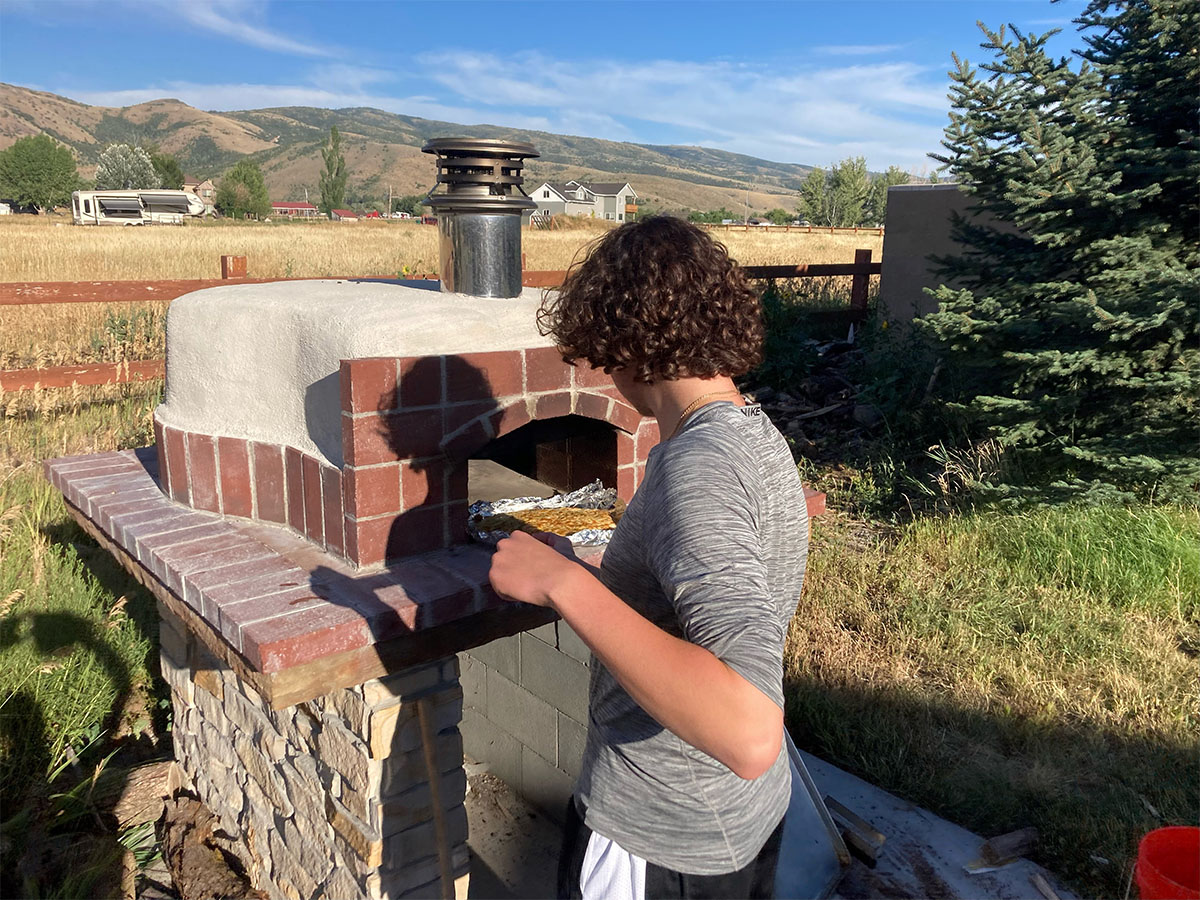
While supporting your teen through ERP, it's essential to step outside your comfort zone, recognizing that intentional exposure leads to significant growth in anxiety or OCD symptoms. Practicing self-care and seeking support for yourself is crucial in this challenging but rewarding journey. Accepting ERP therapy is tough for parents, challenging the instinct to shield or rescue their children from distress. As a parent it is important that you provide support without reassurance, avoiding undermining exposures, and encouraging completion of exposure goals. By doing this you will allow your teen to struggle and gradually increase distress tolerance, leading to a higher level of functioning.
How Do You Know If Your Teen Needs ERP Treatment Or Outpatient ERP Therapy?
If you suspect that your teenager is dealing with OCD or severe anxiety, the first step is to have them undergo a comprehensive anxiety assessment with a mental health professional who specializes in anxiety and OCD. This assessment will help determine the extent of your teenager's mental illness and identify their specific treatment needs.
Once you receive the assessment results for your teenager, find a certified ERP therapist and fully commit to outpatient therapy. Depending on the severity of your teenager's symptoms and how they impact their daily life, if you don’t see progress after 12+ sessions, ask your therapist whether an ERP treatment program would be suitable for your teenager. The decision to opt for an ERP treatment program or continue with outpatient ERP therapy should be based on the severity and duration of your teen's symptoms and the extent to which they interfere with their daily life.
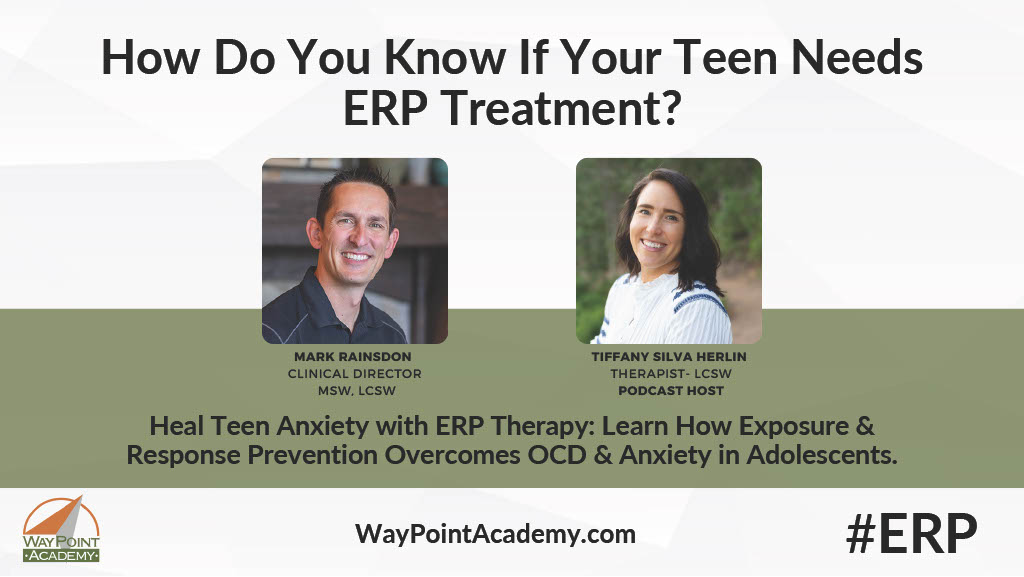
The ERP Difference: Why Choose WayPoint's ERP Treatment Program for Your Teen
At WayPoint Academy, we pride ourselves on being more than just a program that provides ERP therapy. Our approach integrates ERP into every aspect of residential treatment, from therapy sessions to school and residential life, as well as experiential activities. This ensures a comprehensive and personalized treatment experience. Unlike other programs that solely offer talk therapy for anxiety, all of our experienced therapists are trained or certified in the methods taught by the Behavior Therapy Training Institute (BTTI) in ERP therapy. By choosing our program, your teenager will have access to ERP techniques throughout their entire treatment journey.

How Does Waypoint Academy's Unique ERP Treatment Program Help Anxious Teens?
The WayPoint Academy's ERP treatment program offers a personalized and comprehensive approach to therapy. With a thorough understanding that each teenager's experience is different, our therapists work closely with each individual to create a customized treatment plan that focuses on their specific fears and needs. Our targeted exposure therapy and response prevention techniques lead to long-lasting results by addressing their unique anxiety triggers, anxious and obsessive thoughts, and compulsive behaviors. Moreover, the program combines individual, family, and group therapy with experiential activities to reinforce the skills learned in therapy.
This holistic approach ensures a supportive and nurturing environment for teens to practice their newfound coping mechanisms. Our therapists, trained in ERP Therapy, provide support and guidance every step of the way, ensuring that your teen is challenged, but not overwhelmed. Overall, our personalized and comprehensive approach, combined with a holistic treatment plan and experienced therapists, sets our ERP treatment program apart as a top choice for treating severe anxiety and OCD in teens.
Academics Are An Essential Part of ERP Treatment
At WayPoint Academy, we excel at combining academic instruction with ERP therapy to provide a highly supportive learning environment for teenagers with anxiety. Our experienced teachers have received extensive training in ERP techniques and collaborate closely with therapists to create real-life situations where students can practice their coping strategies. This approach promotes long-term success and recovery for our students.
Our curriculum places a strong emphasis on executive functioning skills training, which perfectly complements the benefits of ERP therapy. Through this training, our students acquire the necessary skills to thrive in anxiety-inducing situations such as school, work, and social settings. At WayPoint Academy, our commitment is to empower our students with a comprehensive set of tools to effectively manage their anxiety, regain control over their lives, find success, and thrive in the future.
ERP Residential Program: How Student Life Prepares Your Teen for Real-World Success
WayPoint Academy's residential treatment program offers a secluded and focused environment for anxious teenagers to embark on their journey towards recovery. By eliminating everyday triggers and stressors, we establish a safe space where teenagers can gradually confront their fear in less overwhelming settings. Our therapists, who are trained in Exposure and Response Prevention (ERP), collaborate closely with each individual to develop a personalized treatment plan that directly addresses their unique fears and requirements. With access to both tranquil rural and vibrant urban surroundings, we can provide opportunities that align precisely with your teenager's treatment plan and level of exposure needed. Our committed team of professionals ensures round-the-clock care and support, equipping your teenager with the necessary tools to flourish on their healing path.
Our one-of-a-kind ERP treatment program at WayPoint Academy empowers anxious teenagers to face their fears, cultivate healthier coping skills, and ultimately conquer their severe anxiety and OCD. Through our personalized, comprehensive, and nurturing approach, we equip teenagers with the necessary tools to flourish and live fulfilling lives. Enroll your teenager in WayPoint Academy's evidence-based ERP treatment program and provide them with the best opportunity to overcome their severe anxiety and OCD.
Enrolling Your Teen at WayPoint Academy: Process and Considerations
Enrolling your teen in a treatment program can be a daunting decision, but at WayPoint Academy, we strive to make the process as smooth and supportive as possible. Here is an overview of the process and important considerations to keep in mind when enrolling your teen in our ERP treatment program.
The first step is to reach out to our admissions team, who will guide you through the initial intake process. We will ask you some questions about your teen's symptoms, history, and current struggles to gain a better understanding of their needs. This information helps us develop a personalized treatment plan tailored to your teen's unique situation.

Once your teen is admitted to WayPoint Academy, they will be welcomed into our supportive and nurturing residential treatment environment. Our experienced therapists will conduct a thorough assessment to gain a deeper understanding of your teen's anxiety or OCD symptoms and develop a comprehensive ERP treatment plan.
Choosing WayPoint Academy's ERP treatment program means choosing evidence-based, effective care for your teen. Our residential treatment setting provides a safe and supportive environment for your teen to focus on their recovery without distractions. Our personalized approach and comprehensive therapy ensure your teen receives the individualized attention they need to overcome their anxiety or OCD.
Additional Resources
- Exposure and Response Prevention (ERP) | International OCD Foundation
- About ERP for Teen OCD | International OCD Foundation
- ERP for Children and Teens | Anxiety & Depression Association of America
- Skillfully Building Motivation Toward Exposure Therapy | Anxiety & Depression Association of America
- Obsessive Compulsive Disorder Fact Sheet | American Psychological Association
- What Is Obsessive-Compulsive Disorder? | American Psychiatric Association
- Behavior Therapy Training Institute (BTTI)
About the Authors

Bryan Wilde, LCSW
Executive Director
Bryan is a proud native of Utah. He holds a Master of Social Work degree from the University of Utah, and is a certified ERP therapist through the Behavior Therapy Training Institute (BTTI). Bryan started his therapy career by providing care to adolescents at Island View Residential Treatment Center. Co-founding Pathways to Healing in Bountiful, Utah allowed him to further expand his professional endeavors as a Clinical/Program Director. In addition, Bryan has worked extensively in private practice specializing in working with adolescents and families dealing with mood disorders, anxiety, obsessions and compulsions, trauma, and addiction. His therapeutic approach is comprehensive and emphasizes building strong relationships as the cornerstone for success. Bryan firmly believes in establishing rapport and trust to guide students and families toward realignment. Students at WayPoint describe Bryan as authentic and fair while also recognizing his unwavering dedication as an advocate for their health and well-being. Bryan's exceptional clinical abilities are complemented by his active involvement as an administrator at WayPoint, where he effectively oversees multiple departments. In his leisure time, Bryan enjoys running and spending quality time with his family

Mark Rainsdon, LCSW
Clinical Director
As the clinical director at WayPoint Academy, Mark Rainsdon, LCSW brings a wealth of experience and expertise to our team. Having earned a Master's in Social Work from the esteemed University of Utah, Mark possesses a range of qualifications that distinguish him as a specialist in the field. He has obtained certification as an Autism Spectrum Disorder Clinical Specialist (ASDCS) and is a BTTI-certified ERP therapist. His expertise lies in aiding teenagers struggling with severe anxiety and Obsessive-Compulsive Disorder (OCD), along with students facing neurodiversity-related difficulties. In 2012 Mark got his start in the world of mental health by teaching social skills classes to elementary school students. Since then he has worked in various roles across the mental health field, including as a field staff and primary therapist in wilderness therapy and other treatment programs. Since first joining WayPoint in 2018, Mark has helped countless teens and their families find hope and overcome their mental health struggles. Outside of work, Mark's favorite things to do include spending time with his family, making things, and soaking up the great outdoors.
Is it normal teenage behavior or is it something else? These assessments may help you know how much your teen's and family's life are being affected by anxiety:
- Teen Anxiety Test: Find out if your teen's anxiety could signify something more serious.
- Teen OCD Test: Find out if your teen is experiencing the most common symptoms of OCD.
- Teen OCD Severity Test: Designed to rate the severity of obsessive and compulsive symptoms in teens.
- Family Accommodation Scale: Every parent accommodates their kids. See if the level of accommodation your teen requires is typical or if it severely impacts your family.



